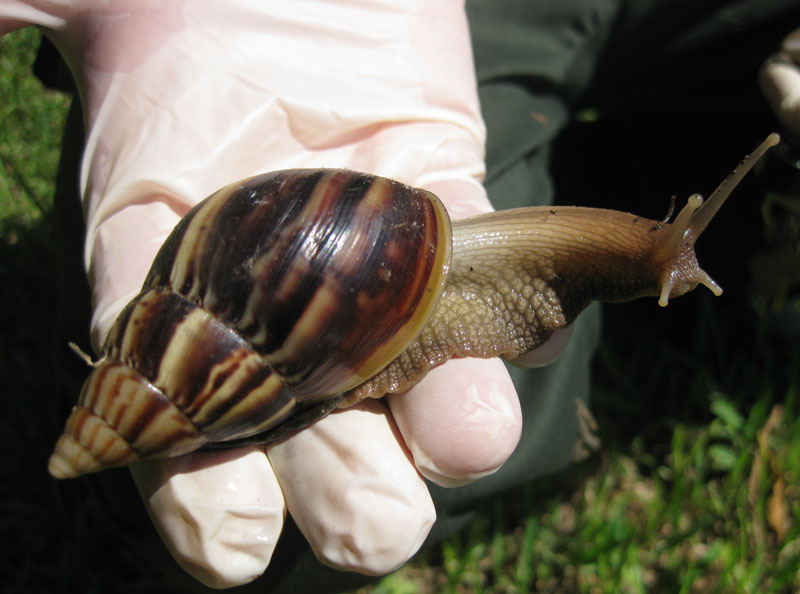Huge snails spreading worries in America
The rapid expansion of a large snail from East Africa in the state of Florida makes the government and people worried.
>>>Technical error kills a number of rare snails
AFP reported that the US Department of Agriculture and the Florida Department of Agriculture mobilized 34 employees in a campaign to stop the expansion of African snails. The US Department of Fisheries and Wildlife is also investigating the cause of African snails - up to 20cm long - flourishing in Miami.
'I'm holding a very big snail. It was said to us that African giant snails like to eat stucco mortar (used for plastering, embossing) because that mortar contains calcium, which the snail shells need to grow , 'Suzi Distelberg, an expert from the Florida Department of Agriculture, said when holding an African snail.
African giant snails can live up to 9 years and breed very quickly (they lay up to 1,200 eggs a year). With these possibilities, a snail can create a large "snail army" to expand across a residential area in a very short time.

The length of the body of the giant African snail can reach 20cm.
But what the medical community is most concerned about is: Mucus on a giant snail body can contain a bacterium that causes meningitis. Farmers are also frightened, because African snails can eat up to 500 species of plants - including lemons and peanuts.
'If their numbers increase to some extent, they can destroy Florida's agriculture , ' said Mark Fagan, an expert with the Florida Department of Agriculture.
It is not known why African giant snails appeared in the state of Florida. They are also found on some Caribbean islands, such as Guadeloupe and Martinique.
This is not the first time that foreign giant snails have invaded Florida. In 1966 a young boy bought three giant snails from abroad to raise. Then his grandmother released them into the natural environment and the number of snails quickly increased to 18,000. The killing campaign took place over nine years, at a cost of more than a million dollars.
Florida state officials hope they will reduce the number of African giant snails before the spring rains come down, as the number of snails is growing rapidly after each rain. Areas with no snails will be monitored in the next few months. The Ministry of Agriculture staff will spray iron phosphate into the gardens. Phosphate iron disturbs the feeding behavior of snails, but does not cause any harm to other animals.
- Strange characteristics of snails
- Strange ability of snails
- Giant snail inflicting in America
- He alerted the giant foreign snail to destroy the garden
- Video: The largest planet snail weighs nearly 5kg
- Dead snails stuck in amber 99 million years
- Detecting exotic snails swimming like butterflies in the ocean
- Train dogs to kill invasive snails
- Throw snails away 20m to clean your garden
- Note when eating snails to avoid processions into the body
- Why can snails crawl through razor sharp blades without harm?
- Endangered species of alien snail species
 Animal 'suffering' after hibernation
Animal 'suffering' after hibernation Why do goats climb well?
Why do goats climb well? Scientists were surprised to see chimpanzees eating turtles
Scientists were surprised to see chimpanzees eating turtles Giant catfish died deadly due to drought in Thailand
Giant catfish died deadly due to drought in Thailand